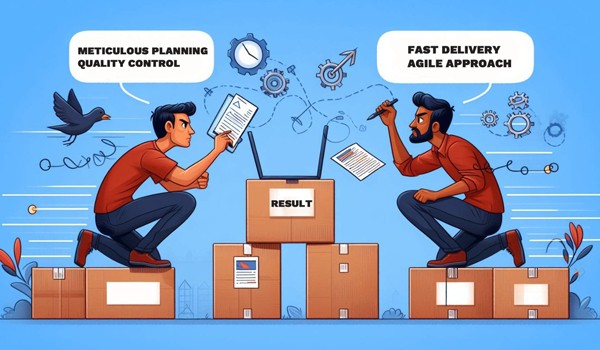Imagine two team members, entrusted with a critical project under tight deadlines, clashing over their approaches. One, meticulously plans every step, prioritising quality through a sequential method. The other, eager for swift results, champions an agile and iterative approach for faster delivery. This scenario exemplifies a task conflict, a common occurrence when team members propose differing methodologies for tackling crucial assignments. However, similar to how ‘impossible’ implies the potential for ‘I’m possible’, these conflicts can be catalysts for fostering productive collaboration.
The key to navigating such situations lies in aligning with the organisational vision and fostering a shared understanding of priorities. “The first step is to discern what holds paramount importance for the organisation,” emphasises Kamlesh Dangi, group head-HR at InCred. He highlights the importance of contextual awareness. In a construction project, for instance, safety might outweigh the urgency of timely delivery.
“The first step is to discern what holds paramount importance for the organisation.”
Kamlesh Dangi, group head-HR, InCred
Prioritising tasks based on their impact further promotes a harmonious work environment. “Not all tasks are created equal,” asserts Tanaya Misra, VP-HR at Endo International. “We need to prioritise tasks that deliver meaningful impact,” she adds.
Clarity is paramount, stresses Pallavi Poddar, CHRO at Fenesta Windows, DCM Shriram. “Conflicts arise from a lack of understanding of the big picture,” he notes. By communicating the overarching goal and timeline, team members gain a shared vision, fostering collaboration over conflict.
Communication styles, work habits, and individual goals can also contribute to task conflicts. While differences exist, “What is essential for one function may not hold the same importance for another,” explains Misra. For instance, timely appraisals are crucial for HR, but colleagues in other departments may prioritise meeting targets or audits.
Strategic task delegation is another approach, recognising the unique strengths of each team member. By breaking down projects into deliverables that align with individual capabilities, conflicting work styles can become complementary. “This way, potential clashes can become opportunities to blend diverse strengths,” points out Poddar.
“Speak your mind, engage in constructive dialogue, but be ready to agree to disagree. Once a decision is made, move forward united.”
Tanaya Misra, VP-HR, Endo International
Furthermore, the urgency-importance matrix plays a vital role. Urgent and important tasks require immediate action, while important but non-urgent tasks necessitate careful planning. Delegation can address tasks that are neither urgent nor important. However, when faced with multiple urgent and important tasks, “Resource optimisation becomes crucial – whether through overtime or seeking additional support,” emphasises Dangi.
However, disagreements can transform into destructive conflicts. Open conversations and healthy discussions are key to prevention. “It’s always about compromise,” says Misra. “Speak your mind, engage in constructive dialogue, but be ready to agree to disagree. Once a decision is made, move forward united,” she suggests.
Observing team dynamics is crucial, notes Poddar, ensuring conflicts are channelled towards productive outcomes. Managers play a critical role in leading conflict situations towards productivity. Dangi advises managers to address the deeper cultural context and help individuals separate the issue from personal differences. He emphasises that the focus should be on resolving the specific disagreement, not resorting to personal attacks.
“By breaking down projects into deliverables that align with individual capabilities, conflicting work styles can become complementary. This way, potential clashes can become opportunities to blend diverse strengths.”
Pallavi Poddar, CHRO, Fenesta Windows, DCM Shriram
Furthermore, managers should create an atmosphere where diverse opinions are valued. “It’s about fostering a culture where compromise is seen as a strength, not a weakness,” emphasises Misra.
Organisations can leverage robust review mechanisms with tailored frequencies based on task urgency. “These short, focused reviews become a platform to assess deliverables, identify support needs, and address any roadblocks promptly,” explains Poddar.
The goal is not to eliminate differences, but to leverage them for common objectives. By creating an environment where team members can share insights and ideas, conflicting approaches can become complementary tools for success. In essence, navigating task conflicts constructively can transform them into opportunities for growth, collaboration, and ultimately, organisational success.






